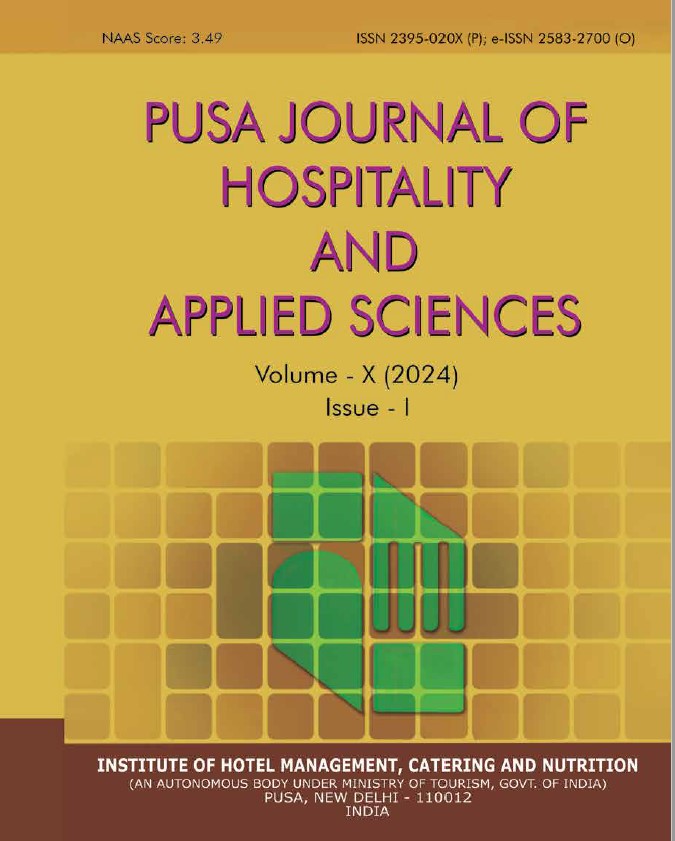Effects Of Covid-19 Pandemic On The Host Communities Of Rohtak, Haryana And Durgapur, West Bengal
Keywords:
COVID-19, Pandemic, Host Community, LockdownAbstract
Background: The ongoing pandemic has caused severe crisis in the hospitality sector with millions of people forced to stay home and under quarantine to stop the spread of contagion. The following paper aims to highlight the problems and difficulties faced by the hospitality sector and the host communities in particular due to the mandatory nation-wide lockdown owing to COVID-19 pandemic. Objective: The purpose of the study was to analyse and highlight the common characteristics of the host community towards the stranded international and domestic travellers while catering and accommodating them owing to local authorities’ obligatory lockdown along with the forced shutdown of hotels and large commercial establishments in Rohtak and Durgapur. Methodology: The geographical area of the research and data collection was limited to the city of Rohtak in Haryana and Durgapur in the state of West Bengal. Population of the study is limited to the region of Rohtak and Durgapur. The number of participants or respondents were 42.The paper is exploratory in design and follows a qualitative methodological approach. The data was collected with the help of an online self-report questionnaire. Results: Over a period of 95 days, the interviews of hosts and tourists were conducted. The content analysis revealed eight themes in all the recorded interviews. A majority of tourists and host communities were impacted by the pandemic in psychological aspects by 35.7%, followed by accommodation and protocols by 33.3% each. Conclusion: There have been various studies that have been conducted in the backdrop of COVID-19 pandemic but not many of them have highlighted the importance of host communities which are an indispensable part of our society as well as the hospitality sector.
References
Alonso, A. D., Kok, S. K., Bressan, A., O’Shea, M., Sakellarios, N., Koresis, A., & Santoni, L. J. (2020). COVID-19, aftermath, impacts, and hospitality firms: An international perspective. International journal of hospitality management, 91, 102654.
Alvesson, M., & Sköldberg, K. (2008). Tolkningochreflektion: vetenskapsfilosofiochkvalitativmetod. Studentlitteratur.
Bai, Y., Yao, L., Wei, T., Tian, F., Jin, D.Y., Chen, L. and Wang, M. (2020). Presumed asymptomatic carrier transmission of COVID-19. Jama, 323(14), pp.1406- 1407.
Bruno, A., Ghanghas, M., Kumar, S. & Nautiyal, R. (2020). India’s Covid-19 lockdown and stranded foreign tourists: A content and sentiment analysis. Bharti Publications.
Chen, M. H., Jang, S. S., & Kim, W. G. (2007). The impact of the SARS outbreak on Taiwanese hotel stock performance: an event-study approach. International Journal of Hospitality Management, 26(1), 200-212.
Cochran, W. G. (2007). Sampling techniques. John Wiley & Sons (pp. 84).
Cutler, S. Q., & Carmichael, B. A. (2010). The dimensions of the tourist experience. The tourism and leisure experience: Consumer and managerial perspectives, 44, 3-26.
De Sausmarez, N. (2004). Crisis management for the tourism sector: Preliminary considerations in policy development. Tourism and Hospitality Planning & Development, 1(2), 157-172.
Dombey, O. (2004). The effects of SARS on the Chinese tourism industry. Journal of Vacation Marketing, 10(1), 4-10.
Fox, W., & Bayat, M. S. (2008). A guide to managing research. Juta and company Ltd (pp. 53).
Gautam, S. and Trivedi, U. (2020). Global implications of bio-aerosol in pandemic.
Gössling, S., Scott, D. and Hall, C.M. (2020). Pandemics, tourism and global change: a rapid assessment of COVID-19. Journal of Sustainable Tourism, 1-20.
Iyer, P., Aziz, K., &Ojcius, D. M. (2020). Impact of COVID‐19 on dental education in the United States. Journal of dental education, 84(6), 718-722.
Jauhari, V., Malhotra, R. and Venkatesh, U. (2009). Pre‐crisis period planning: lessons for hospitality and tourism. Worldwide Hospitality and Tourism Themes (pp. 70).
Kaushal, V. and Srivastava, S. (2021). Hospitality and tourism industry amid COVID 19 pandemic: Perspectives on challenges and learnings from India. International journal of hospitality management, 92, 102707.
Kim, D.H. (2020). Health effects of the COVID-19 pandemic by sex. Korean J. Women Health Nurs, 26(2), pp.106-108.
Nicola, M., Alsafi, Z., Sohrabi, C., Kerwan, A., Al-Jabir, A., Iosifidis, C., Agha, M., & Agha, R. (2020). The socio-economic implications of the coronavirus pandemic (COVID-19): A review. International Journal of Surgery, 78, 185.
Nkengasong, J. (2020). China’s response to a novel coronavirus stands in stark contrast to the 2002 SARS outbreak response. Nature medicine, 26(3), 310-311.
Norris, F. H., Stevens, S. P., Pfefferbaum, B., Wyche, K. F., &Pfefferbaum, R. L. (2008). Community resilience as a metaphor, theory, set of capacities, and strategy for disaster readiness. American journal of community psychology, 41(1-2), 127-150.
Pine, R., &McKercher, B. (2004). The impact of SARS on Hong Kong’s tourism industry. International Journal of Contemporary Hospitality Management.
Radhakrishna, S.A., 2020. COVID-19| Post-pandemic, India’s Tourism Sector Stares at 70% Job Loss.
Roser, M., Ritchie, H., Ortiz-Ospina, E., &Hasell, J. (2020). Coronavirus pandemic (COVID-19). Our world in data.
Sharma, S. (2020, June 3). 2m Distancing, Masks Key to Stopping Covid-19 Spread: Study. Hindustan TimesSharma, S. (2020, June 3). 2m Distancing, Masks Key to Stopping Covid-19 Spread: Study. Hindustan Times. https://www.google.com/amp/s/www.hindustantimes.com/india-news/social distancing-masks-eye-wear-and-hand-washing-work-best-in-combination study/storyyROOhsGvHO0Zp7eAZpJmjJ_amp.html
Traveller, C. N. (2020). Himachal Pradesh Reopens for Tourists, but Many Kullu Manali Hotels to Stay Closed.
Wen, Z., Huimin, G., &Kavanaugh, R. R. (2005). The impacts of SARS on the consumer behaviour of Chinese domestic tourists. Current Issues in Tourism, 8(1), 22- 38.
Wu, C., Chen, X., Cai, Y., Zhou, X., Xu, S., Huang, H., & Song, Y. (2020). Risk factors associated with acute respiratory distress syndrome and death in patients with coronavirus disease 2019 pneumonia in Wuhan, China. JAMA internal medicine.




